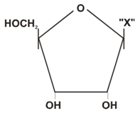Constitutive heterochromatin includes:
1. The Barr body.
2. A region of active gene expression.
3. Telomeres.
4. Both 1 and 2.
Dideoxyribonucleotide chain-termination is a method of
1. cloning DNA.
2. sequencing DNA.
3. digesting DNA.
4. synthesizing DNA.
A sequential expression of a set of human genes occurs when a steroid molecule binds to
1. mRNA
2. DNA sequence
3. tRNA
4. Ribosome
Given below is the diagrammatic representation of one of the categories of small molecular weight organic compounds in the living tissues. Identify the category shown and the one blank component "X" in it.

Category Component
1. Cholesterol Guanin
2. Amino acid NH2
3. Nucleotide Adenine
4. Nucleoside Uracil
Who amongst the following scientists had no contribution in the development of the double helix model for the structure of DNA?
1. Rosalind Franklin
2. Maurice Wilkins
3. Erwin Chargaff
4. Meselson and Stahl

To unlock all the explanations of 38 chapters you need to be enrolled in MasterClass Course.

To unlock all the explanations of 38 chapters you need to be enrolled in MasterClass Course.
During transcription, if the nucleotide sequence of the DNA strand that is being coded is ATACG, then the nucleotide sequence in the mRNA would be:
1. TCTGG
2. UAUGC
3. UATGC
4. TATGC

To unlock all the explanations of 38 chapters you need to be enrolled in MasterClass Course.

To unlock all the explanations of 38 chapters you need to be enrolled in MasterClass Course.
DNA fragments are:
1. Positively charged
2. Negatively charged
3. Neutral
4. Either positively or negatively charged depending on their size




